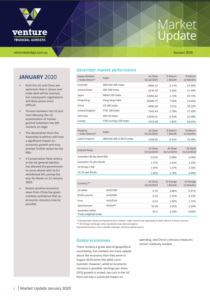The Pulse
- Both the US and China are optimistic that a ‘phase one’ trade deal will be reached, but subsequent negotiations will likely prove more difficult.
- Tension between the US and Iran following the US assassination of Iranian general Soleimani has left markets on edge.
- The devastation from the Australian bushfires will have a significant impact on economic growth and may prompt further action by the RBA.
- A Conservative Party victory in the UK general election has allowed the government to move ahead with its EU withdrawal bill, paving the way for Brexit on 31 January 2020.
- Recent positive economic news from China has given markets confidence that an economic recovery may be possible.
Australia
The Australian economy enters 2020 growing well below potential growth rates, with excess capacity in the labour market and inflation slightly under 1.0%, below the target rate. This suggests the RBA maintains a bias to cutting cash rates further.
Global economies
There remains a great deal of geopolitical uncertainty, but markets are more upbeat about the economy than they were in August 2019 when the yield curve inverted.
US
By the end of 2019 markets were optimistic that a ‘phase one’ trade deal could be reached between the US and China, which would see a lowering of tariffs. A Chinese delegation is set to arrive in Washington DC on 13 January to sign the agreement.
Europe
Europe’s manufacturing sector continues its decline. In Germany it is contracting at its fastest rate since the GFC and only in France and Greece is the sector seeing any growth. The services sector, while it is expanding, is growing slowly while inflation remains well below target at an annualised 1.3% across the eurozone.
China
Recent economic news out of China has been more upbeat. A range of better-than expected data releases and, of course, the expectation of a ‘phase one’ trade deal with the US, supported the view that a more significant downturn in Chinese growth could be averted (at least for now)
Asia Region
Japan’s September quarter GDP was revised up to an annualised 1.8% from 0.2%, thanks to business investment growing by a higher-than-expected 7.3%. Consumption contributed 1.2 percentage points, investment 1.1 and the public sector 0.7 percentage points
